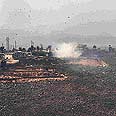

So why did the Lebanon border skirmish take place? To be honest, this very question is being asked not only in Israel. Many are asking it in Lebanon as well – President Michel Suleiman, Prime Minister Saad Hariri (who was vacationing in Sardinia,) and even Hezbollah Chief Hassan Nasrallah.
These figures, and not only they, were surprised by the incident. With the passage of time it appears that the accurate sniper fire directed at IDF forces was a local, well-organized initiative, rather than a mad outburst by a crazed soldier. Apparently, field commanders endorsed the attack.
In Beirut, President and former Army Chief Michel Suleiman, as well as Lebanon’s current chief of stuff, rushed to issue ostentatious endorsements of their army’s actions, even though they had no idea about the plans to open fire. Yet they weren’t the only ones who didn’t know. It appears that Hassan Nasrallah himself was caught by surprise – had the incident spun out of control, he would have been the target of Israel’s harshest blow.
Nasrallah attempted to blur this in the speech he delivered in Beirut Tuesday, declaring that his organization would “cut off Israel’s arm.” However, one cannot dispute the facts: His group did not open fire, and he admitted that this was intentional, in a bid to stay out of the game. Hezbollah is certainly not interested in war, at least not at this time.
However, the question of “why” is not the only one being looked at now. The other important question is whether the incident was related to the immense pressure building up in Lebanon ahead of the international indictments over the assassination of late PM Hariri.
Lebanese water barrel
The answer to this question is complex. On the one hand, the incident is apparently unrelated. After all, Nasrallah and his people, who are facing the pressure, did not initiate the border skirmish. Nasrallah does not wish to be portrayed as a provocative element in Lebanon at this time, but rather, as a dignified element that wishes to safeguard the interests of all Lebanese.
On the other hand, the pressure faced by Hezbollah, which is directing it towards the whole of Lebanon, is threatening to erupt – whether inside Lebanon or outside, towards Israel. At this time, Lebanon can be likened to a tightly sealed water barrel. The first to poke a hole in it would have to contend with the water outburst.
In any case, the major skirmish served to nicely highlight the rules of the game in the Lebanese theater: On the one hand, everyone condemns Israel automatically. On the other hand, everyone, including Syrian president Assad, makes do with words for the time being. On Tuesday we saw a parade of figures slamming Israel and accusing it of a “criminal act.” However, as it turned out, these figures quickly realized what exactly had materialized and moderated their tones. Soon after the incident, field commanders sought a ceasefire with Israel and the evacuation of the dead and wounded.
Yet beyond all these questions, one question mark must concern everyone – the Lebanese army. The same army lauded by Israel when it deployed in southern Lebanon following the Second Lebanon War, in the hopes that it would replace or at least restrain Hezbollah’s activity in the area, has surprisingly turned out to be a problematic element.
As it turns out, it is unclear to what extent this army adheres to orders from Beirut. It’s a military whose field commanders take potentially fateful initiatives, and in any case some suspect that it is highly vulnerable to Hezbollah penetration, if only for the simple reason that about half of its troops are Shiite.
Will this military – which usually excels in ceremonies but rushes to get out of the area at times of confrontation – stand by Hezbollah in a future clash? Or what’s even graver: Is it possible that Lebanese army officers and soldiers will initiate the move that would lead to the next confrontation? In the final analysis, another element that had not been taken into account before is now part of the boiling Lebanese arena – this element may also end up poking a hole in the overloaded Lebanese barrel.
- Follow Ynetnews on Facebook















